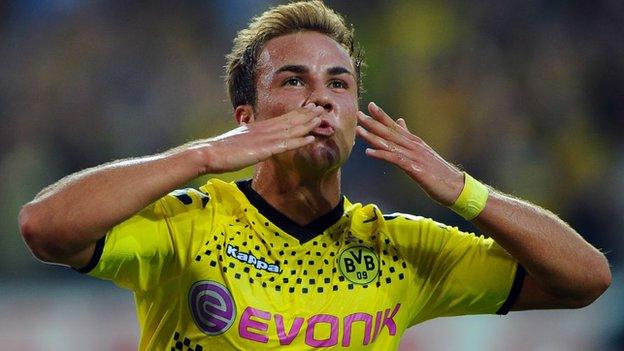Mario Gotze: Has 'Germany’s Messi' been handed a career lifeline?
- Published
- comments

Gotze scored 45 goals in 219 appearances for Borussia Dortmund
Mario Gotze was once seen as Germany's answer to Lionel Messi.
But after his steep rise to the top of the football world he could never quite meet expectations and, at 28, Gotze could make his PSV Eindhoven debut against PEC Zwolle on Sunday, as he bids for a fresh start.
After spending most of the first half of 2020 on the bench at Borussia Dortmund, his contract quietly ran out. There was little buzz around the attacking midfielder once he became a free agent.
Most of Europe's top clubs did not seriously consider acquiring Gotze's services during the summer and it took him until last week to secure a new club, as he signed a two-year contract with PSV.
Setbacks and frustration
Gotze's downfall in recent years was caused by a mix of bad luck and astronomically high expectations. When he scored the winner for Germany against Argentina in the 2014 World Cup final, he had the world at his feet.
Germany's head coach Joachim Low told him that he should show the world that "he is better than Messi" before sending him on to the field against Argentina. At that point, Gotze was already an established name in European football.
His transfer from Dortmund - where he'd come through the academy - to Bayern Munich, announced a couple of weeks before both teams met in the 2013 Champions League final, made headlines all around the world. The German 'wunderkind' left one German powerhouse to join an even bigger one.
50 Great World Cup moments: Mario Gotze's cup-winning goal for Germany - 2014
Once he arrived at Bayern, Gotze never lived up to the expectations. He every so often showcased his outstanding skills, but never became a leader or integral player.
Gotze made his first attempt to revive his career when he returned to Dortmund in 2016, though injuries and a prolonged metabolic disorder interfered with his plans.
He made 103 appearances and scored 14 goals over the course of four years before Dortmund gave up on their 'talent of the century' this summer and did not offer him a new contract.
When the summer transfer window opened, the five-time Bundesliga winner was a free agent for the first time in his career. He had to train by himself while waiting for a call from a major club, which never came.
Gotze told the media in September: "I desperately want to win the Champions League once. That's what drives me every day, in every training session. I don't want to end my career without that title."
He hired Fali Ramadani as his new agent midway through the transfer window, hoping that the shrewd dealmaker could help him to find a team. There was confirmed interest from a Major League Soccer team and a few Bundesliga clubs, including Hertha Berlin, FC Cologne and Bayer Leverkusen.
While Gotze at first believed he could get a contract that would pay him close to the yearly salary of 10m euros he earned at Dortmund, he had to realise that he was not considered a premium player anymore.
When Gotze spoke to managers like Hertha's Bruno Labbadia, they raised questions about his fitness. Labbadia was convinced that Gotze could become his former self again, but only if he would invest a lot of time on the training ground.
Rediscovering the love for football
PSV Eindhoven manager Roger Schmidt contacted him eight weeks ago, initially believing there was only a slim chance Gotze would want to join.
Schmidt told him that he could rediscover his love for football in the relaxed environment in Eindhoven - an idea that Gotze seemingly bought into.
"You expect someone like Gotze to play for a major club in a big football country," Peter Bosz, Bayer Leverkusen's manager, told the Dutch newspaper De Telegraaf. "PSV might be a big club, but in a small football country."
Some interpreted the move as an attempt by Gotze to leave the past behind him and make a fresh start at PSV, one of the dominant clubs in the Eredivisie.
"PSV is the total package. The fans and the club with their ambitions made the difference," Gotze said after his signing announcement.
There is certainly a realistic scenario in which Gotze will thrive against the opposition in the Eredivisie. However, it might take him time to adapt to PSV's fast-paced, Dutch-style 4-2-4, as the 63-cap Germany international has struggled with a lack of explosiveness in recent years.
"He has the gift to make his teammates around him better," Schmidt said. "But it is important that we can get him into his best shape and he can be his best self." Signing with PSV is a gamble for Gotze, because if he cannot make it at this club then his career at the highest level is over.
Considering how Gotze has struggled in recent years, it might be best for him to be in the Netherlands rather than in the limelight in Germany or England. He has to shelve his plans to win the Champions League because PSV are only competing in the Europa League this year, but the Dutch club could be the right place for Germany's former wunderkind to enjoy the game again.